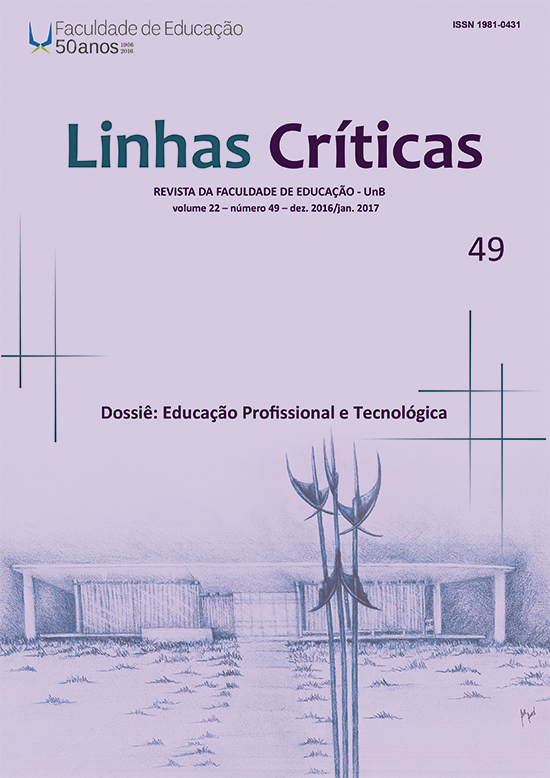The thesis of the primacy of previous recognition over cognition: contributions to educational processes
DOI:
https://doi.org/10.26512/lc.v22i49.5001Keywords:
Previous recognition, Cognition, Expressive gestures, Existential implicature, Educational processesAbstract
This paper explores the Honneth’s thesis of the primacy of recognition over cognition, based on the concept of previous recognition. The aim is to show that Honneth’s theses on the primacy of recognition over cognition, explained through the concepts of previous recognition, expressive gestures and attitude of existential implication, offers important educational implications. This is shown when related to the hypothesis of some continuity between the expressive gestures of children socialization and the modalities of appearing and manifestation in the broader public space in which the subject will act, and also with regard to the affective and cooperative dimensions that would be placed at the foundations of human recognition and educational processes.
Downloads
References
ADORNO, T. W.MinimaMoralia.Paris: Editions Payot, 2001.
BOLTANSKI, L; CHIAPELLO, E. O novoespírito do capitalismo. São Paulo: Martins Fontes, 2009.
CENCI, A. V. Reconhecimento, realização de si e paideia: sobre o sentidoatual de umantigo ideal. In: BOMBASSARO, L. C.; DALBOSCO, C. A.; KUIAVA, E. A. (Orgs.) Pensarsensível: homenagem a Jayme Paviani. Caxias do Sul: Educs, 2011. p. 317-329.
CENCI, A. V. Reconhecimento, conflito e formaçãonateoriacrítica de Axel Honneth.Educação e Filosofia, Uberlândia, v. 27, n. 53, p. 323-342, jun. 2013a.
CENCI, A. V. Individualização e reconhecimento.Educação, Porto Alegre, v. 36, n. 03, p.314-324, dez. 2013b.
CENCI, A. V. Reconhecimento e progresso moral: aportes da concepção de modernidade deHonnethparaaideia de formaçãohumana. LinhasCríticas, Brasília, v. 19, n. 39, p. 271-288,maio/ago. 2013c.
CENCI, A. V.Autonomia, reconhecimento e educação. PráxisEducativa, Ponta Grossa, v. 10, n. 1, p. 253-274, jan./jun. 2015. Disponívelem: http://www.revistas2.uepg.br/index.php/praxiseducativa.
DALBOSCO, C. A. Reificação, reconhecimento e educação. RevistaBrasileira de Educação, Rio de Janeiro, v. 16, n. 46, p. 33-51, jan./abr. 2011. DOI: 10.1590/S1413-24782011000100003
DALBOSCO, C. A. Condiçãohumana e formaçãovirtuosa da vontade: profundezas doreconhecimentoemHonneth e Rousseau. Educação e Pesquisa, São Paulo, v. 40, n. 3, p.799-812, jul./set. 2014. DOI: 10.1590/s1517-97022014091625
DIAZ, A. Educación, reconocimiento y ciudadanía. REP - RevistaEspaçoPedagógico, v. 18, n. 2, Passo Fundo, p. 259-270, jul./dez. 2011.
HERNÁNDEZ I DOBON, F. J; HERZOG, B; MARTINS, M. R.La educación y la teoríadelreconocimiento: entrevista aAxel Honneth. Educação&Realidade, Porto Alegre, v. 42, n. 1, p. 395-406, ene./mar. 2017.http://dx.doi.org/10.1590/2175-623670297.
FAGUNDES, A.; TREVISAN, A. L. A reificação da formaçãodocente e aonipresença dascompetências. Espaçopedagógico, Passo Fundo, v. 21, n. 1, p. 110-131, jan./jun. 2014.DOI: /10.5335/rep.v21i1.3876.
HONNETH, A. Grounding Recognition: A Rejoinder to Critical Questions, in Inquiry: An Interdisciplinary Journal of Philosophy, v.XLV, n. 4, p. 499-519, 2002.
HONNETH, A. Luta por reconhecimento: a gramática moral dos conflitos sociais. São Paulo: Editora 34, 2003.
HONNETH, A. Redistribution as recognition: a response to Nancy Fraser. In: FRASER, N; HONNETH, A. Redistribution or Recognition. London/New York: Verso, 2003b. p. 110-197.
HONNETH, A.The point of recognition: a rejoinder to the rejoinder. In: FRASER, N; HONNETH, A. Redistribution or Recognition. London/New York: Verso, 2003c. p. 237-267.
HONNETH, A. Erkennen und Anerkennen: ZuSartresTheorie der Intersubjektivitat. In: Unsichtbarkeit:StationeneinerTheorie der Intersubjektivität. Frankfurt a.M.: Suhrkamp, 2003.
HONNETH, A. La societédumépris.Paris: La découverte, 2006.
HONNETH, A. La reconnaissancecommeidéologie. In: La societédumépris.Paris: La Découverte, 2006a, p.245-274.
HONNETH, A. Invisibilité: surl`épistémologie de lareconnaissance. In: La societé du mépris.Paris: La Découverte, 2006b, 225-243.
HONNETH, A.; HARTMANN, M. Les paradoxes du capitalisme: unprogramme de recherche. In: La societé du mépris.Paris: La découverte, 2006c, p.275-303.
HONNETH, A. Capitalismeetréalisation de soi: les paradoxes de l’individuation In:La societé du mépris.Paris: La découverte, 2006d, p.305-323.
HONNETH, A.; VOIROL, O. La théorie critique de l`ecole de Francfortet la théorie de la reconnaissance. In: La societé du mépris.Paris: La découverte, 2006e, p.151-180.
HONNETH, A. Reificación: um estudioenla teoria delreconocimiento. Buenos Aires: Katz, 2007.
HONNETH, A. Rejoinder. In: PETHERBRIDGE, D. (Ed.) Axel Honneth: Critical Essays.Leiden/Boston: Brill, 2011, p.391-421.
KANT, I. Critique de laraison pratique. Paris:ÉditionGallimard, 1985.
MEAD, G. H. Mind, self and society: from the standpoint of a social behaviorist. Chicago: The University of Chicago Press, 1992.
PIROMALLI, E. La teoria delriconoscimentodiAxel Honneth: dalle sue origini a Das Recht der Freiheit. Roma. UniversitáSapienza, 2012 (Tese de doutorado).
STERN, D.La primerarelación madre-hijo. Madrid: Morata, 1984.
STERN, D. O mundo interpessoal do bebê: uma visão a partir da psicanálise e da psicologia do desenvolvimento.Porto Alegre: Artes Médicas 1992.
TOMASELLO, M. Origens culturais da aquisição do conhecimento humano. São Paulo: Martins Fontes, 2003.
TOMASELLO, M. Por quécoperamos? Madrid: Katz, 2010.
TREVISAN, A. L.; ROSSATTO, N. D. Reificação e reconhecimento: reflexões para apesquisa em educação. Linhas Críticas, Brasília, v. 16, n. 31, p. 275-286, jul./dez. 2010.
VOIROL, O. Présentation - Visibilité et invisibilité: une introduction.Réseaux, n. 129-130, p.9-36, 2005/1.
Downloads
Published
How to Cite
Issue
Section
License
Copyright (c) 2017 Linhas Críticas

This work is licensed under a Creative Commons Attribution 4.0 International License.
Authors who publish in this journal agree to the following terms:
-Authors maintains the copyright and grants the journal the right of first publication, the work being simultaneously licensed under the Creative Commons Attribution License which allows the sharing of the work with recognition of the authorship of the work and initial publication in this journal.
- Authors are authorized to enter into additional contracts separately, for non-exclusive distribution of the version of the work published in this journal (eg publish in institutional repository or as a book chapter), with acknowledgment of authorship and initial publication in this journal.
-Authorers are allowed and encouraged to publish and distribute their work online (eg in institutional repositories or on their personal page) at any point before or during the editorial process, as this can generate productive changes as well as increase the impact and the citation of published work (See The Effect of Free Access).



